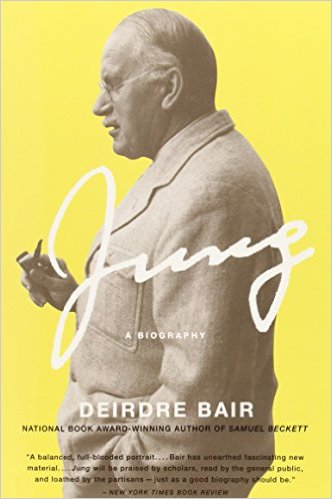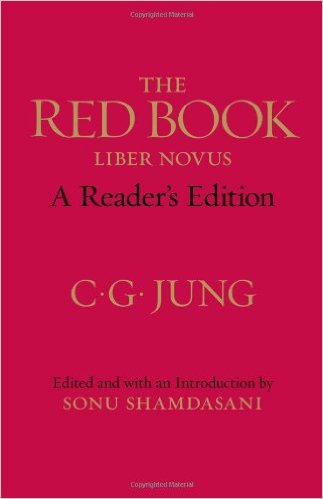
I periodically pick up Deirdre Bair’s biography of Jung and page through it, reading a chapter here, more chapters there I’ve never been able to sit down and read it from cover to cover. With the index, it’s nearly 900 pages long.
But tonight I happened to turn to a section from Jung’s The Red Book, a massive journal that started because of, as Bair describes it, “his first psychotic vision” during a journey by train to Schaffhausen. “The vision occurred after he decided it would be dishonest to continue treating patients using ‘Freudian theoretical assumptions.’” This happened around the time of his break with Freud, war was imminent, and Jung was “beset by so many other dreams and fantasies…that he was led to formulate the theory of active imagination, the process of concentrating on a single image or event long enough to allow it to develop its own volition.”
This sounds a lot like what happens in lucid dreaming, where you wake up inside a dream and seize on a particular image that will enable you to move more fully into the dream. The idea with lucid dreaming, though, is that by seizing on an image, you eventually are able to control and manipulate the dream.
On another train trip in 1914, Bair writes, Jung realized that that the only way he could define a system separate from Freud’s would be to treat himself as though he were his own patient. So he decided to confine his new journal to “language metaphors,” and allow the unguided flow to pour out of him. The first time he sat down to write, “he remembered hearing a distinctly female voice speaking quietly but with authority. “This is art,” she said.
According to Bair, this made Jung angry because he thought he was constructing “an empirical science.” Eventually, this female voice morphed into a male voice, Elias, who didn’t stick around long, and then into a second male voice, Philemon. “Jung described Philemon as the pagan voice of an old man of ‘simply superior knowledge.
To me, this sounds like channeling. Or like the muse of a deeply creative person whose voice and personality are distinctly different from that of the individual. Jung believe that Philemon was teaching him “psychological objectivity, the reality of the soul.
Many of his Philemon writings are in The Red Book, which the Jung family kept under wraps for years because it smacked of madness. It includes not only Jung’s writings during this period, but his sketches, paintings, doodle, the inner self made manifest in art and words.
Years after Jung started The Red Book, he allowed his translator and friend, R.F.C. Hull to read The Red Book. Hull is best known for his translation of The Collected Works of C.G. Jung. His take on The Red Book is fascinating for its insight into the connection between madness and genius, between creativity and the unconscious, and into Jung himself.
“Talk of Freud self-analysis – Jung was a walking asylum in himself, as well as its head physician.” Hull thought The Red Book provided “the most convincing proof that Jung’s whole system is based on psychotic fantasies – which of course it is – and therefore the work of a lunatic.” But he compared Jung to a medicine man, a shaman “who understood madness and can heal it, because at periods they are half-mad themselves.”
Jung’s achievement, Hull concluded, “…lay in hammering that material into a system of psychotherapy that worked.”
I think Hull missed the mark in many respects. But in all fairness to Hull, he was Jung’s contemporary and was seeing the material from that perspective. To me, it seems that Jung’s legacy went well beyond his system of psychotherapy.
His work hurled open doors about the nature of human consciousness and how it impacts the nature of our personal realities, what we experience day to day in our own lives. It coincides with fairly recent discoveries in quantum physics that tell us an event doesn’t happen until it is observed, which is another way of saying that consciousness is the sum total. Everything. Without it, a thousand trees can fall in a forest but if there’s no one around to see it, to hear it, has it actually happened?
Thanks to Jung, the idea that we create our lives from the inside out, through our thoughts, beliefs, desires, intentions- through everything that makes up our consciousness – is not quite the outlier notion it once was. Debate the idea with yourself, with family and friends. Argue for or against it. Think about it, mull it over, seriously consider it. And then ask yourself: Suppose Jung was right?
And suppose synchronicity is the place where it all bleeds out, coalescing in seemingly miraculous and stunning ways? Suppose synchronicity, the term that Jung coined, is the voice of that quantum theory?

I actually wrote this post in 2016 and ran across it tonight. It still holds true for me.








I was trying to find the room number of the Canadian hotel Whitley stayed in which he writes about in his book ‘The Key’ and found this article which says the encounter happened on June 6th, 1998 –
“At two-thirty in the morning of June 6, 1998, Whitley Streiber was awakened by somebody knocking on his hotel room door. A man came in, and everything he said was life-altering.
This is the unsettling and ultimately enlightening narrative of what happened that night. Strieber was never really sure who this strange and knowing visitor was–a “Master of Wisdom”? A figure from a different realm of consciousness?
A preternaturally intelligent being?
He called him the Master of the Key.
The one thing of which Strieber was certain is that both the man and the encounter were real.
The main concern of the Master of the Key is to save each of us from self-imprisonment.
“Mankind is trapped,” the stranger tells Strieber. “I want to help you spring the trap.” In a sweeping exchange between Strieber and the stranger–which takes the form of a classical student- teacher dialogue in pursuit of inner understanding–the unknown man presents a lesson in human potential, esoteric psychology, and man’s fate.
He illuminates why man has been caught in a cycle of repeat violence and self-destruction–and the slender, but very real, possibility for release.”
https://nextlevelsoul.com/whitley-strieber/
Chis MacKEY is also obsessed with the date June the 6th ironically –
https://brizdazz.blogspot.com/2020/06/chris-mackey-positive-psychology-of.html
I believe it’s his wife’s birthday!
Well, here’s another synch, considering Jung wrote a book about UFOs.
Look at the news story which appeared in the mainstream media today on the anniversary of Jung’s passing –
https://www.news.com.au/technology/science/space/intelligence-whistleblower-claims-us-has-retrieved-craft-of-nonhuman-origin/news-story/effecbf0e0489a31d2175fc3717715bf
I saw that!!
All I can say is Wow! Wow!
I have that big fat RedBook and will have to get it out again. Thanks
That red bbook is a treasure!
Did you post this because the 6th of June is the day Jung passed away, or was it just a coincidence that you posted it today?
A synchronicityy!! I’s totally forgotten the date of his death, Daz.